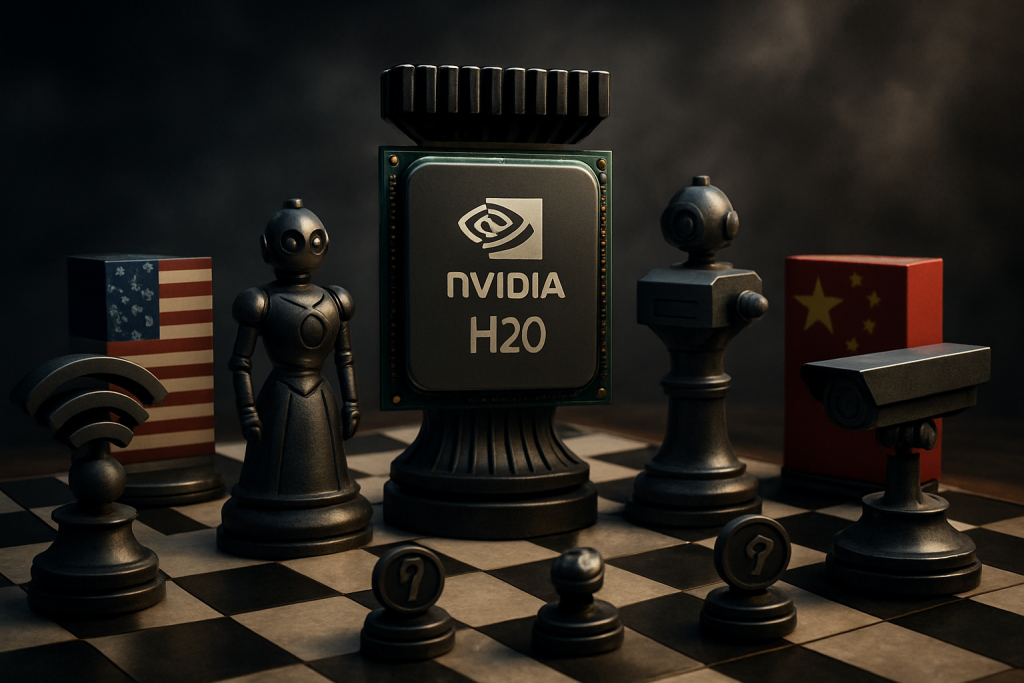In a move that sent ripples through the tech world, Chinese authorities slammed the brakes on domestic tech companies purchasing Nvidia’s H20 chips on August 20, 2025. The reason? A perceived snub from U.S. Commerce Secretary Howard Lutnick, whose words ignited a firestorm of diplomatic and technological repercussions. Think of it as a real-world game of Risk, where control of the AI landscape is the ultimate prize, and careless words can trigger a full-blown tech war.
Lutnick’s alleged “insulting” remarks, suggesting the U.S. doesn’t export its best technology to China, struck a nerve. It’s like telling Tony Stark he can’t have the latest arc reactor. Chinese leaders, feeling the sting of this perceived slight, reportedly retaliated by instructing domestic firms to pull back from Nvidia’s H20, a chip specifically designed to navigate the tricky waters of U.S. export restrictions while still delivering AI muscle to the Chinese market.
The backstory here is crucial. Nvidia, the undisputed king of GPUs, had been walking a tightrope for years, balancing its desire to tap into the massive Chinese market with the ever-tightening grip of U.S. export controls. The H20 was their solution, a carefully engineered compromise. It was meant to be the olive branch, a way to keep the AI conversation going despite the growing geopolitical chasm. But as they say, the best-laid plans of mice and men, and apparently, chipmakers, often go awry.
The H20, in essence, was a “lite” version of Nvidia’s top-tier AI processors. It offered a respectable level of performance, enough to power many AI applications, but it intentionally fell short of the threshold that would trigger U.S. export bans. Think of it as the decaf version of a powerful espresso shot, still providing a jolt, but without the jitters (or in this case, the export restrictions).
Now, with Chinese firms potentially turning their backs on the H20, Nvidia faces a significant challenge. They had reportedly restarted H20 production due to renewed interest from China, making this pullback an especially painful blow. It’s like finally getting the band back together, only to have the lead singer walk out mid-concert. The immediate impact? A likely dip in revenue and a serious dent in their strategic positioning within the Chinese market. Their competitors, both domestic and international, are undoubtedly watching this unfold with keen interest, ready to pounce on any opportunity to fill the void.
But the implications extend far beyond Nvidia’s bottom line. This incident throws a spotlight on the increasingly fragile nature of U.S.-China relations, particularly within the technology sector. It’s a stark reminder that even carefully crafted compromises can crumble under the weight of political tensions. Remember the trade wars of the late 2010s? This feels like a new chapter in that ongoing saga, with AI chips now taking center stage.
For Chinese tech companies, this move could be a catalyst for accelerated innovation. Forced to look inward, they may ramp up their efforts to develop indigenous AI hardware solutions. This could lead to a surge in investment in domestic chip design and manufacturing, potentially fostering a new generation of Chinese AI giants. It’s like Bruce Wayne being forced to build his own gadgets after losing access to Wayne Enterprises’ resources. Necessity, after all, is the mother of invention.
The situation also raises some profound ethical and philosophical questions. Is it possible to truly decouple technology from geopolitics? Can companies like Nvidia navigate the complex web of international relations without becoming pawns in a larger game? And what role should governments play in regulating the flow of technology across borders? These are questions that will likely dominate the AI conversation for years to come.
Financially, the repercussions could be significant. Nvidia’s stock price will likely experience volatility as investors digest the news. More broadly, the incident could trigger a reassessment of the risks associated with investing in companies that rely heavily on the Chinese market. It’s a reminder that even the most promising technologies can be vulnerable to the whims of political winds.
Ultimately, the Nvidia H20 situation is more than just a business story. It’s a microcosm of the larger power struggle playing out on the global stage, a battle for technological supremacy that will shape the future of AI and, indeed, the future of the world. And it all started with a few words, a reminder that in the high-stakes game of international relations, even the smallest gestures can have enormous consequences.
Discover more from Just Buzz
Subscribe to get the latest posts sent to your email.


